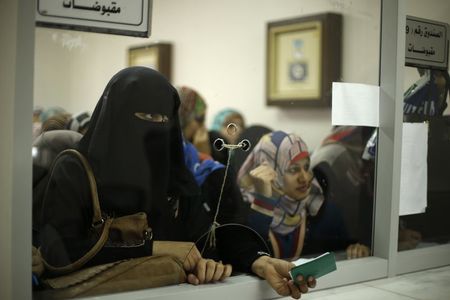By Nidal al-Mughrabi
GAZA (Reuters) - Some 24,000 civil servants hired by the Islamist group Hamas, many of whom have not received a full salary in almost a year, finally got some pay on Wednesday from the new Palestinian unity government based in the West Bank.
The funds were supplied by the gas-rich kingdom of Qatar, which is an ally of Hamas. But the fact the cash was delivered by the West Bank administration gave a boost to hopes that the unity pact between Palestinian rivals might bear fruit.
Hamas fighters seized control of Gaza in 2007 from forces loyal to Western-backed President Mahmoud Abbas. Mutual distrust has festered ever since, marring hopes of building an independent state combining the various Palestinian territories.
However, the two sides finally signed a reconciliation pact in June and, after negotiations involving the United Nations, vehicles carrying cash for the salaries travelled from the West Bank via Israel and into the nearby, isolated Gaza Strip.
Thousands of employees crowded at the gates of Gaza post offices from the early hours of the morning to collect individual payments of $1,200 -- a rare boon after a devastating war with Israel which battered the enclave in July and August.
"This money is going to pay my debts. I have to pay for the delayed rent payment, electricity, water bills, the supermarket and the butcher," said health employee Mahmoud Al-Serhy.
United Nations chief Ban Ki-moon has described it as a "humanitarian payment" and the money in no way made up for the months of constant shortfalls or zero salaries. There are no immediate plans for it to recur next month, or anytime soon.
Additionally, some 13,000 employees of the Gaza security establishment loyal to Hamas and a further 3,000 civil servants, were excluded from the payment.
DISTANT HOPES
Hamas refuses to relinquish its arms against Israel and is blacklisted as a terrorist group by the West. When it seized Gaza it set up its own civil service while the PA's 70,000-strong work force continued to draw salaries from the West Bank, despite the fact that most of them were no longer working.
In a move that shocked Israel, Abbas formed a unity government of non-partisan technocrats on June 2 in the wake of failed U.S.-sponsored Israeli-Palestinian peace talks.
The joint administration of Gaza and the West Bank was meant to pave the way for long-overdue elections, but that looks a distant hope as deep distrust persists.
Neither side wishes to concede their vision of a future Palestine - Abbas's Fatah party wants to live alongside Israel in a state including the West Bank, Gaza and East Jerusalem while Hamas wants to destroy Israel through force of arms.
This summer's war -- the third such conflagration since 2007 -- killed 2,000 Palestinians, mostly civilians, and destroyed hundreds of homes and businesses. More than 70 Israelis, almost all of them soldiers, were killed.
International donors this month pledged around $5.4 billion dollars to patching Gaza's ruined neighbourhoods and shoring up the PA's finances, but slow movement on Palestinian unity may make those countries wary of paying up.
Despite the money in their pockets, few Gazans appeared optimistic about the future.
Ahlam Al-Shaer, an employee at the ministry of culture in Gaza, said colleagues had given up hope that the unity deal would improve their lives anytime soon.

"Given what we know and what we hear, there will not be another payment in at least another three months," she said.
(Editing by Noah Browning and Crispian Balmer)
